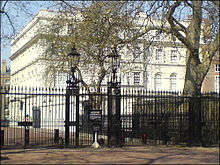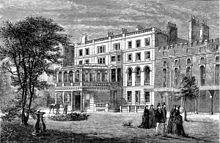Clarence House


Clarence House is a British royal residence on The Mall in the City of Westminster, London. It was built in 1825-1827, adjacent to the royal palace of St James's for the royal, Duke of Clarence, the future king, William IV. Over the years, it has undergone extensive remodelling and reconstruction, most notably after being damaged during the Second World War, and little remains of the original structure as designed by John Nash. It is Grade I listed on the National Heritage List for England.[1] The house is open to visitors for approximately one month each summer, usually in August. The four-storey house is faced in pale stucco.
Clarence House is the official residence of Charles, Prince of Wales, and his wife Camilla, Duchess of Cornwall. Since 2003, the term Clarence House has been used as a metonym for the private office of the Prince of Wales. (The term St James's Palace had been used previously.) Clarence House was also the official residence of Prince William from 2003 until April 2011, and of Prince Harry from 2003 until March 2012.[2] From 1953 until 2002, it was home to Queen Elizabeth The Queen Mother,[3] and before her, it was the official home of Princess Elizabeth, the future queen.
History[]

The house was built between 1825 and 1827 to a design by John Nash. It was commissioned by the Duke of Clarence, who in 1830 became King William IV of the United Kingdom (reigned 1830–1837). He lived there in preference to the adjacent St James's Palace, an ancient Tudor building which he found too cramped.[citation needed]
From William IV, the house passed to his sister Princess Augusta Sophia, and, following her death in 1840, to Queen Victoria's mother, Princess Victoria of Saxe-Coburg-Saalfeld.[4] In 1866, it became the home of Queen Victoria's second son Alfred, Duke of Saxe-Coburg and Gotha (also Duke of Edinburgh), until his death in 1900.[5]
Alfred's younger brother Prince Arthur, Duke of Connaught and Strathearn, Queen Victoria's third son, used the house from 1900 until his death in 1942. During his tenure, for a brief period in the 1930s, it was the location of the library of the School of Oriental and African Studies until all universities in London were evacuated in 1939,[6] and the school temporarily relocated to Cambridge.[7]
During World War II, it suffered damage by enemy bombing during The Blitz (1940–41). Following the death of the Duke of Connaught in 1942, it was used by the Red Cross and the St John Ambulance Brigade as their headquarters during the rest of World War II.
Following their marriage in 1947, it became the residence of Princess Elizabeth and her husband, Prince Philip, Duke of Edinburgh. Their daughter, Princess Anne, was born there in 1950.
In 1953, after the death of her father King George VI (d. 6 February 1952), and her accession as Queen Elizabeth II, she moved to Buckingham Palace. Her mother, Queen Elizabeth, and Princess Margaret moved into Clarence House. Also at the start of her widowhood, the Queen Mother purchased the Castle of Mey in Scotland as a summer residence.
Princess Margaret later moved into an apartment in Kensington Palace,[5][8] whilst the Queen Mother remained at Clarence House and at the Castle of Mey, until her death in March 2002.
Since 2002 (upon the death of The Queen Mother), Clarence House has been the London residence of Charles, Prince of Wales and his wife, Camilla, Duchess of Cornwall. Until their marriages in 2011 and 2018, respectively, the House was the London residence of Prince William, Duke of Cambridge and Prince Harry, Duke of Sussex.
See also[]
- Birkhall – a house in Aberdeenshire, Scotland; inherited by the Prince of Wales from Queen Elizabeth The Queen Mother
- Highgrove House – a house near Tetbury, Gloucestershire; the family residence of the Prince of Wales and the Duchess of Cornwall
- Llwynywermod – a house in Carmarthenshire, Wales; owned by the Duchy of Cornwall
References[]
- ^ Historic England, "Clarence House (1236580)", National Heritage List for England, retrieved 17 January 2017
- ^ Prince Harry moves into Kensington Palace
- ^ "Who lived in Clarence House?". royalcollection.org. Archived from the original on 19 June 2015. Retrieved 19 June 2015.
- ^ Walford, Edward. "St James's Palace Pages 100-122 Old and New London: Volume 4. Originally published by Cassell, Petter & Galpin, London, 1878". British History Online. Retrieved 13 July 2020.
- ^ Jump up to: a b "History of Clarence House". royal.gov.uk. Archived from the original on 2 May 2014. Retrieved 19 June 2015.
- ^ University of London: An Illustrated History: 1836–1986 By N. B. p.255
- ^ Nature, 1939, Vol.144(3659), pp. 1006–1007
- ^ Tori V. Martínez. "Palaces on the Periphery: Marlborough House and Clarence House". Retrieved 19 June 2015.
External links[]
| Wikimedia Commons has media related to Clarence House, London. |
- Clarence House at the Royal Family website
- Clarence House, at The Royal Collection – Visitor Information
- Clarence House, Official website of the Prince of Wales
- Houses in the City of Westminster
- Historic house museums in London
- Museums in the City of Westminster
- Royal buildings in London
- Royal residences in the United Kingdom
- Grade I listed houses in London
- Grade I listed buildings in the City of Westminster
- Houses completed in 1827
- 1827 architecture
- 1827 establishments in England
- John Nash buildings
- Neoclassical architecture in London
- Buildings and structures on The Mall, London
- Regency architecture in London



